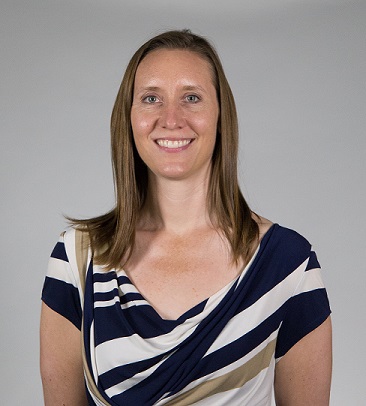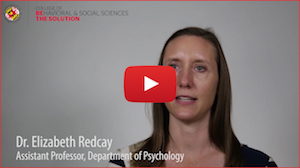PSYC Researchers Study Brain Circuits and Social Interactions in Children with Autism
A research team from the University of Maryland Department of Psychology received a $2.6 million grant from the National Institutes of Mental Health (NIMH) to investigate whether certain brain networks in children with autism spectrum disorders make social interaction more difficult than for typically developing children.
“While it is clear that atypical social interaction plays an important role in autism, we still do not understand what may be going on in the brain to account for these difficulties,” said Dr. Elizabeth Redcay, an assistant professor of psychology, who is leading the five-year study. Redcay discusses the research project in the video below:
While other researchers have attempted to answer this question using more traditional methods, Dr. Redcay and her team will use an innovative, interactive approach to examine how brain circuits change during social interactions in real-time while children are undergoing a functional MRI scan.
Both typically developing children and children with autism spectrum disorders between the ages of seven and 14 will visit UMD to complete activities and games in the Developmental Social Cognitive Neuroscience Lab, and then to undergo a brain scan at the university’s Neuroimaging Center. Researchers will spend a significant amount of time prior to the scans getting to know the children and making them comfortable with the process by having them practice lying still inside a mock scanner decorated to resemble a spaceship. Once inside the real machine, children will be able to hear and see an experimenter through an image projected onto a mirror. As the experimenter and child engage in back-and-forth conversation and go through various scenarios, researchers will be watching for changes in various areas of the brain.
 “We actually have children receive live feedback from a social partner (the experimenter) so if they do something like perform a task quickly enough, such as pushing a button to answer a question, then they can see their social partner come online and give them a positive thumbs up or some kind of positive reward,” Redcay explained. “This way we can study these brain networks and how these brain networks are interacting with each other when children are actually having social interactions.”
“We actually have children receive live feedback from a social partner (the experimenter) so if they do something like perform a task quickly enough, such as pushing a button to answer a question, then they can see their social partner come online and give them a positive thumbs up or some kind of positive reward,” Redcay explained. “This way we can study these brain networks and how these brain networks are interacting with each other when children are actually having social interactions.”
Gaining a better understanding of the systems underlying social interaction could lead to the development of new strategies to help children on the autism spectrum overcome social challenges, which may improve other aspects of life as well.
“The amount that a child shares with others and that motivation to engage with others in social settings is important to forming friendships and close personal relationships, but it’s much more than that too,” Redcay said. “It’s directly related to how many words a child learns, how good they are at understanding people even years later so basically that fundamental ability of being able to engage in social interactions successfully is really important early in development in autism but continues to be important throughout the life span.
Collaborators on Dr. Redcay’s research team include UMD Psychology Professor Dr. Luiz Pessoa, Dr. Audrey Thurm from the National Institutes of Health and several UMD graduate and undergraduate students.
Published on Mon, Aug 29, 2016 - 12:11PM




